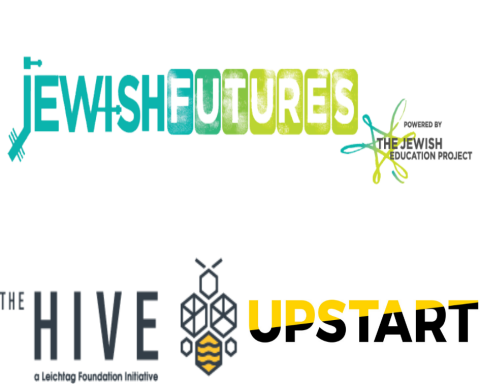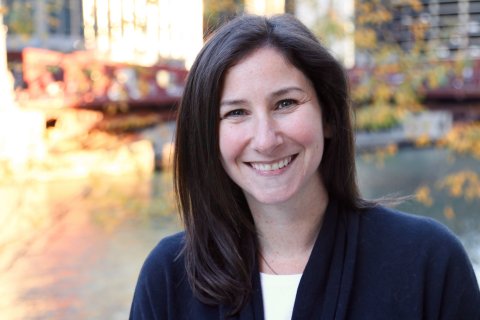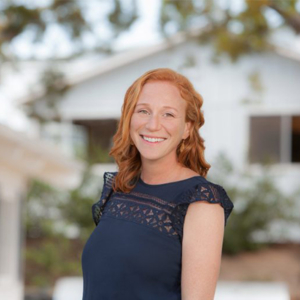The Jewish Education Project Goes Westward: The Jewish Futures Conferences and the Conversation about Power

This year, following The Jewish Education Project’s December conference in New York, “Power to the People,” a day-long conference that explored the changing contours of power in our increasingly democratized society and the associated changes taking place in Jewish education, two more conferences, taking place on May 14th in Chicago and May 30th in San Diego, will continue the conversation, amplifying the theme of shifting power dynamics in Jewish education to a national level.
In this interview, conference planners from the Jewish Education Project’s partners at UpStart (Chicago) and the Leichtag Foundation (San Diego) delve deeper into the conferences’ conceptualization and anticipated outcomes. Here’s what Aleeza Lubin (UpStart) and Jenny Camhi (Leichtag Foundation) had to say:
Q: When you think about the theme for this year's Futures conferences—Power, or New Power—how do you think it resonates most deeply for your constituency and the community for which this conference is held?
Aleeza Lubin:
The Midwest is fairly grounded in tradition, and so it’s a place that struggles to explore new frontiers and adapt. We are aware that adaptation and evolution is necessary, but we’re not entirely comfortable with it or knowledgeable about how best to proceed. Also, the conversation we’re having is actually bigger than simply an exploration of the education platform and the ways in which shifting power dynamics are affecting that realm. In the Midwest, it ladders up to movements, synagogues, leaders of large-scale institutions and the group think that often happens in those environments.
Jenny Camhi:
There has been a renewed sense of activism over the past 2 years in our local community, but people often bifurcate their identity as an activist and a Jew. We strongly believe that when people can connect to their Jewish identity to their activism it strengths their obligation to both.
Q: Why do you think this topic is so relevant to education, in general, and to Jewish education specifically?
Aleeza Lubin:
Emerging generations are pushing back against presumptive norms of Jewish practice, and, in order to allow them to see themselves in Judaism in an authentic way, we have to set them up to practice as they want. That means educating them in a way to be prepared for change, and current educational models aren’t fit for that.
In education more broadly, the same is true. If we want future generations of innovative thinkers, we can’t rely on methods of teaching that focus power in the hands of the educator and a traditional read of the information. The focus has to shift to the method or construct of learning, and we must allow the learner to find him/herself in the information.
Jenny Camhi:
This topic is relevant to Jewish education because it provides children (and adults) the opportunity to actualize the values of our tradition. The topics of our conference, power dynamics such as #metoo, immigration justice and racial justice are surrounding our youth on a daily basis, and giving them an opportunity to learn about these issues through a Jewish lens is a powerful way to give them a voice in the conversation.
Aleeza Lubin of Upstart

Q: What Jewish values undergird your vision for this conference and augment or bolster the New Power focus?
Aleeza Lubin:
Ometz lev (courage) is critical and connected to UpStart’s value of risk-taking. To begin to consider some of these notions of shifting power takes real imagination and the openness to try something new in a place and time when no one can be sure of the outcome.
Jenny Camhi

Jenny Camhi:
One of the strongest Jewish values which supports our vision is not standing idly by as these power dynamics seep into our community and cause hurt and destruction. Every person has a role to play, whether that be speaking up for those who are victimized or being brave and acknowledging one’s own role in the power dynamic.
Another Jewish value that we feel strongly speaks to this conference is Ometz Lev—it takes courage to even engage in these conversations in a thought provoking and honest manner. We feel strongly that in order for this program to be effective, it must be done with openness and true self-reflection as educators and about the lens with which we teach.
Q: Which speakers or ideas expanded your thinking most OR which speakers/ideas are you most excited to hear/explore?
Aleeza Lubin:
I’m really excited to hear Benay Lappe. I’m drawn to the idea that the educator and her method can work hand-in-hand to create a space wherein learning is deepened and people can be deeply impacted by sacred text in order to further understand themselves. I’m also eagerly anticipating our teen/young leader roundtable conversation. The diversity of their experiences is incredible, and yet their thinking seems to coalesce around the opportunity to do better when meeting the educational needs of young people.
Jenny Camhi:
Guila Benchimol has an incredibly interesting perspective being both a Jewish Educator and a researcher on the topic of sexual violence. I appreciate her perspective of looking within our community to address these issues, rather than putting a blindfold on and pretending that sexual assault does not occur in the Jewish community. I believe there has been a huge gap in the conversation on this topic. We often discuss the extreme cases and miss the underlying culture shift that needs to happen for the behaviors that are often dismissed as “not a big deal” or “playful”. We have come to accept these behaviors and norms which makes it difficult for individuals to speak their own truth.
Q: Who is the intended audience for your conferences? Why do you think these people, specifically, need to engage with these ideas?
Aleeza Lubin:
We think our content will speak to a wide audience: educators, education directors, funders, Jewish spiritual and religious leaders, synagogues and Federation professionals.
Jenny Camhi:
We have a broad and diverse target audience for this conference because we believe that these concepts can be applied at any age and in any type of education. What is the correct language to teach a 5-year-old that when he or she is playing chase and the other person says “stop” that it truly means stop? How do we incorporate language about consent into a Birthright trip or a peer-lead retreat for young adults? How do we best educate our teachers about racial bias in Jewish educational settings so that every single individual who walks into a Jewish experience feels welcomed and included?
Q: What is the role of discomfort in the Jewish Futures conference and/or in Jewish ed in general?
Aleeza Lubin:
We’re proud and excited that this is not a conference that provides answers. It poses questions that are meant to challenge our traditional thinking and champions UpStart’s values of risk-taking and optimism.
Jenny Camhi:
The topics discussed in the Jewish Futures Conference are not easy or comfortable topics. However, the purpose is to use our educational spaces as ways to push the boundaries of Jewish engagement. Participants will be asked to look within themselves and the communities they serve to understand their role in these power dynamics and the best ways to challenge them.
Malka Fleischmann is Director of Knowledge and Ideas for The Jewish Education Project.